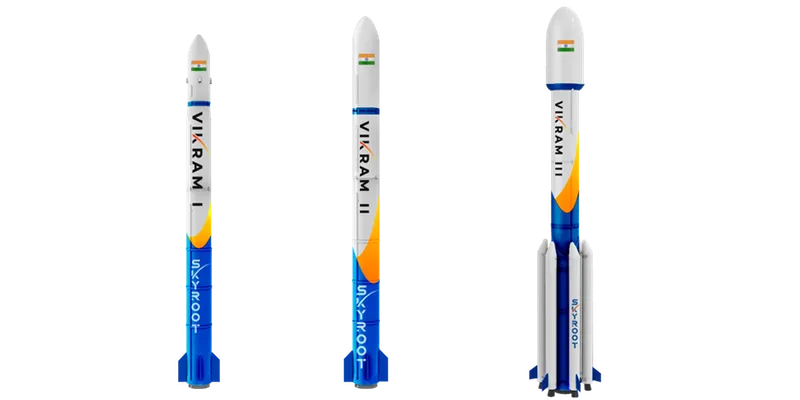[Tech30] This spacetech startup by former ISRO scientists can put small satellites in orbit within a week
With rocket architecture that is modular and can be mass produced, Tech30 startup Skyroot Aerospace claims it can triple the payload capacity with additional upgrades.
Gone are the days when only government-run space agencies could send satellites and rockets to space. Today, corporates and even budding startups can and are doing so. And no, we’re not talking about Elon Musk, Jeff Bezos, or Richard Branson.
Meet Pawan Kumar Chandana (29) and Naga Bharath Daka (30), two former ISRO scientists who founded Skyroot Aerospace in June 2018. The Hyderabad-based spacetech startup is building small satellite launch vehicles (SSLV) for small satellites, and promises to launch them into space within a week of a customer’s approach.
This is an impressive claim since sending a small satellite (weighing less than 500 kg) into space would normally take a little more than six months by a government-run space agency.

The Skyroot Aerospace team has its sights on space.
With a product and promise like that, it is no wonder that the company caught the attention of investors like Mukesh Bansal and Ankit Nagori, Co-founders of CureFit, who invested Rs 10.3 crore in Skyroot as seed funding in June 2018.
Currently, the team is in the process of raising its Series A round, and the founders hope to close it in the next couple of months.
The beginning
An alumnus of IIT-Kharagpur, Pawan was working as a scientist at the Vikram Sarabhai Space Centre (VSSC) in 2012. He was also an active part of the GSLV-Mk-III project for five years. In his sixth year, he became the depurty project manager for the small satellite launch vehicle project.
Bharath, an alumnus of IIT-Madras, also joined VSSC in 2012 but as a flight computer engineer. He built hardware and firmware for multiple on-board computer modules implementing sequencing, navigation, control, and guidance functions of a launch vehicle.
And like any other space enthusiast, the two were mighty impressed by Elon Musk’s venture.
Speaking to YourStory, Co-founder and CEO Pawan says,
“We were awestruck by what SpaceX pulled off - from failing the first three launches to consistently landing a huge rocket booster. It proved what a startup with great conviction, right vision, and the right team could achieve in a decade.”
The low orbit problem
Manufacturing satellites is one thing, but sending them to a low Earth orbit is a different ballgame altogether. But Skyroot Aerospace is bringing in a solution for this very problem.
The startup manufactures three types of launch vehicles - Vikram I, II, and III - named after Dr Vikram Sarabhai, the Father of the Indian space programme. At present, Skyroot claims to be the only company in the world that can carry payloads ranging from 200-700 kg to a low Earth orbit.
Pawan explains, “Most of the vehicle engineering is complete and manufacturing has begun. Also, most of the rocket will be manufactured and tested in next 15 months, making us one of the first few companies in the world to test multiple rocket stages.”
Interestingly, the startup has designed its vehicles in a way so that they can be assembled and launched on-demand - in just a few days. Since the design is not complicated, the parts can even be manufactured and stored in bulk.
The CEO adds, “We designed it considering the capabilities and constraints of the manufacturing ecosystem in India.”
He says that this vision helped the team build a vehicle that requires minimal manufacturing infrastructure unlike international companies that can build their own manufacturing and testing facilities.
Pawan says, “With the added benefit of operating in India, we save a huge amount of developmental cost incurred in building and operating our launch vehicles.”
A cheaper alternative
Launching satellites is a serious business, and not a cheap one either. For example, US-based small satellite company Virgin Orbit charges $40,000 for one kg (approximate) of payload. But, Skyroot Aerospace plans to charge as low as $15,000 per kg.
In fact, the vehicles are designed keeping the availability of resources in India in mind.

Vikram series launch vehicles (from left to right Vikram I, II and III).
Every launch vehicle is a combination of several small vehicles called ‘stages’ and each stage has its own propulsion. Skyroot’s rocket has three stages and uses propulsion technology developed in-house. The startup uses solid propulsion for the first two stages, and liquid propulsion for the upper stage.
According to Pawan, Skyroot Aerospace is one of the few spacetech startups in the world with the expertise to develop solid and liquid propulsion technologies.
He adds, “Solid propulsion systems are inherently more reliable due to lesser components and need much lesser development time and cost. But they need a strong domain expertise, which our team has. Our propulsion systems have the capability to produce very large thrust, making them the best-suited systems for small satellite launch vehicles.”
The founders claim that its rocket architecture is modular and can be mass produced. The startup can almost triple the payload capacity with just a few additional upgrades. It plans to launch some exciting new products that will be announced early next year.
One-of-a-kind all-rounder
Skyroot’s launch vehicle is one of a kind, says Pawan. It uses the combination of three propulsion technologies - production-friendly solid propulsion technology, Earth-storable liquid propulsion technology, and highly-efficient cryogenic propulsion technology.
He adds, “We are soon going to test a 3D-printed liquid propellant engine, and a fully composite (carbon fibre) and high-performance solid rocket motor.”

A visual representation of the Vikram series launch vehicle.
Further, the uppermost stage of the vehicle can restart frequently, which means that inserting multiple payloads in different orbits on a single mission is possible, a trait rarely available in current launch vehicles across the globe.
“The most interesting part is that we could recoup all the developmental cost incurred and break even with just a few launches, making a very solid business model,” the co-founder says.
Skyroot Aerospace’s launch vehicle can also be used to de-orbit its final stage from the space, reducing space debris.
Market and opportunities
Skyroot Aerospace is also in talks with satellite companies to sign-up customers for its first few launches, Pawan says.
A report by Euroconsult states that 7,000 small satellites will be launched by 2027. And by the end of 2030, an additional 11,746 small satellites will be launched, says Frost & Sullivan.
In fact, the entire launch market is projected to be worth $69 billion in the next 10 years, presenting quite an opportunity for this Hyderabad startup.
“The market is ripe for the first 10 operating players internationally and after that, it could get very cost-competitive,” the co-founder says.
The skyrocketing team
At present, Skyroot Aerospace has a team of 35, all from the aerospace industry with at least five years of experience in either the DRDO or ISRO. The team also includes people who have worked at organisations like HAL, TATA Advanced Systems, and GE.
Pawan says, “Understanding the correct skillset is very important. Having worked in this industry before, we are very good at identifying the right talent and building the right team.”
Soon, the startup will test multiple rocket stages, making them one of the very few companies to achieve this feat.
Once Skyroot Aerospace manages to launch its vehicles successfully, it plans to design a larger reusable launch vehicle to carry geostationary satellites to geostationary orbits that are at an average height of 35,786 km from Earth.
(Edited by Saheli Sen Gupta)
YourStory’s Tech30 companies list is an annual selection of 30 carefully curated and disruptive tech-based startups that we believe will shape the new narrative for India and the world. To get a complete overview of the 2019 Tech30 companies list, download the Tech30 Report here.


![[Tech30] This spacetech startup by former ISRO scientists can put small satellites in orbit within a week](https://images.yourstory.com/cs/2/4e0288202dda11e9b78a8b7eb69eb573/Imageq31r15639664556071571070566463png?mode=crop&crop=faces&ar=2%3A1&format=auto&w=1920&q=75)



![[Funding alert] Bengaluru spacetech startup Astrogate Labs raises pre-Series A round from Speci...](https://images.yourstory.com/cs/2/4e028820-2dda-11e9-b78a-8b7eb69eb573/Untitled_designastrogate15571467184611561392898579.png?fm=png&auto=format&h=100&w=100&crop=entropy&fit=crop)




